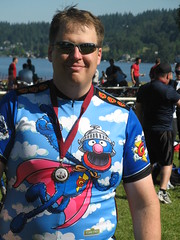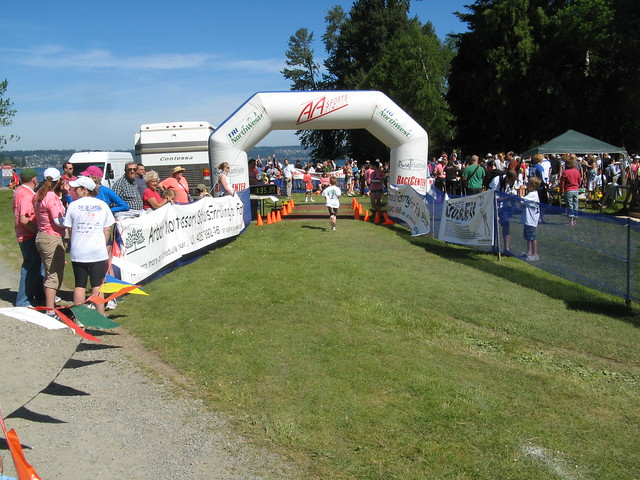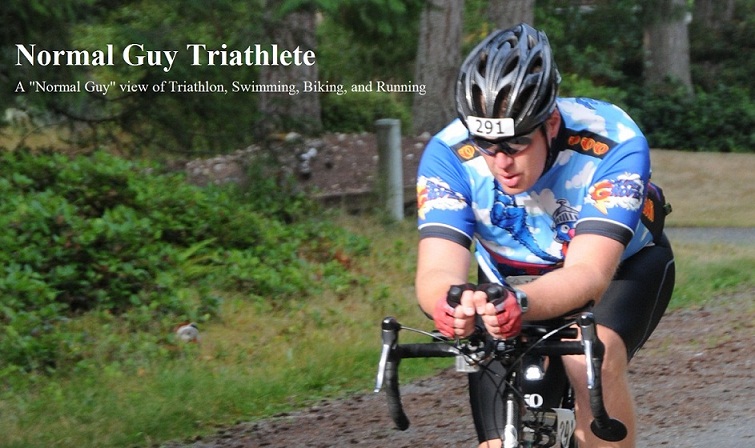 The 2007 Issaquah Triathlon, my first Tri experienceThis is a follow-up post to: Why do I Tri?
The 2007 Issaquah Triathlon, my first Tri experienceThis is a follow-up post to: Why do I Tri?
The popularity of triathlons grows by leaps and bounds every year, especially shorter Sprint or Olympic distance races. According to a recent NY Times article the fastest growing age segment is Men in their 40's. While I'm not there yet I do have some of the same aspirations quoted in that article, such as weight loss and "trying to stay as young as I can for as long as I can."
Don't think you're ready?
Don't think you have what it takes? Maybe you have a physical disability that says otherwise? Think again...
http://patriciaironmantexas.wordpress.com/
I am amazed by some of the people that I see racing even in the small local events that I frequent here in Washington state: old (88 and barefoot!), young (11 and riding a BMX bike), and everything in between. I do it to maintain/lose weight and, most importantly, to have fun. Yes, you can have fun while training and enduring physical pain. I do it by singing Christmas songs during the race and watching people's reaction as we pass (usually they are passing me, rarely the other way around).
If you need some more inspiration check out the Ironman Championship replays on NBC/Universal Sports. My kids LOVE to watch it. Look it up on your local cable/satellite provider, you won't be disappointed. On each one they profile the pros and several other inspirational athletes. Watching Chrissie win her first race was incredible but her second win was even more exciting.
What is my current fitness level?
The best place to begin is to look at your current level of fitness and activity. Many people already exercise more than enough to enter a casual race and at least finish it. When I did my first triathlon (the 2007 Issaquah Triathlon) I was jogging 5K 3x per week and commuting by bike 1-3x per week (20 miles round trip). All I had to do was add in the swim and I was set (more or less).
Ask yourself these questions. If you answer "yes" to more than 2 then you are just about ready to race!
- Do you exercise 2-5x per week?
- Can you do 60-90 minutes of constant aerobic activity?
- Can you ride at least 10 miles?
- Can you jog at least 3 miles?
- Can you swim at least 400 meters (1/4 mile)?
Which distance?
How far can you swim/bike/run today, even as a single activity? Does that already map to typical triathlon race distances?
Sprint - Swim: 400-800m, bike: 12-15 miles, run: 5-7km
Olympic - Swim: 1500m, bike: 24 miles, run: 10km
Half-Iron (70.3) - Swim: 1.2 miles, bike: 56 miles, run: 13.1 miles
Ironman (140.6) - Swim: 2.4 miles, bike: 112 miles, run: 26.2 miles
Matching your current activity level to the race distances above will give you a much better entry point for your triathlon career. Start small and work your way up.
Where do I start?
Health: The first place to start is your doctor's office. Get a full physical exam by your primary care physician. Do you have a physical condition that may limit your physical exertion (i.e. heart condition, diabetes, MS, the list goes on...)? If you already have a known health condition there may be special considerations that will need to be factored into your training plans. Your exercise patterns may also affect your treatment plans for chronic conditions for better or worse.
Goal Setting: Start with a goal. Look for a goal that will stretch you, something that appears beyond your reach right now. For me, back in 2007, that was a simple "flat as a pancake" Sprint Tri. For others it may be a more challenging Sprint or even an Olympic Distance Tri. Setting your goal low in the beginning may make it easy to reach but make sure you have another goal set out beyond that initial goal, something to look forward to after you finish that first race. And, yes, with some preparation you will indeed finish that first race. It took a lot of bike commuting, training runs, and practice swims to be able to finish that first race.
 Training Plan: Putting together a plan is the best way to accomplish your goal. You can start with simple things like balancing your workout during the week. Will you do each activity (swim/bike/run) multiple times each week? Do you need to focus extra time on a very weak skill? (i.e. swimming, as in my case)
Training Plan: Putting together a plan is the best way to accomplish your goal. You can start with simple things like balancing your workout during the week. Will you do each activity (swim/bike/run) multiple times each week? Do you need to focus extra time on a very weak skill? (i.e. swimming, as in my case)
I found the idea of training plans several years after I started and wow, do they make a difference. I used the "20-week, run focused" plan from BeginnerTriathlete.com last year when I did my first Olympic. The plans are basic and can be tailored to your need. The main thing is to look for a plan that matches your goals and time horizon (don't start a 20-week program with 10 weeks to go before race day).
Coaches/Trainers: I used a personal trainer several years ago when I was in a weight loss program and it worked really well. She was able to tailor a training plan that fit my goals and specific body needs. Many people find coaches and trainers to be invaluable but they can be quite expensive. If you are on a budget a good way to start is with many of the free plans found online and if that doesn't work then find a coach or trainer that can help you develop a plan that works. It may take a lot of trial and error but in the end it is vital that you find a way that helps you accomplish your goals.
As with any race, there is a start and a finish. Once you start you can finish: all it takes is one stroke after another, then one pedal after another, then one foot in front of the other, and eventually you make it to the end. Once you do make it, chances are you'll be hooked and want to Tri again. This will be a great learning experience and the start of something amazing in your life. It certainly has been for me.
Even my son is into it now. He started at age 7...
 Finish Line, 2009 Issaquah Triathlon
Finish Line, 2009 Issaquah Triathlon
